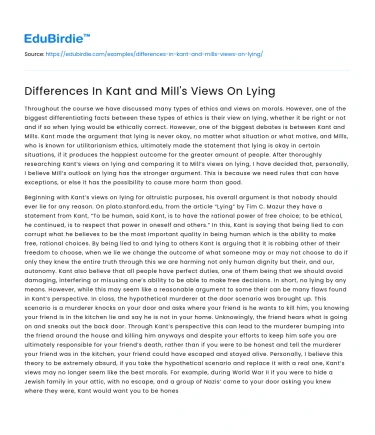Throughout the course we have discussed many types of ethics and views on morals. However, one of the biggest differentiating facts between these types of ethics is their view on lying, whether it be right or not and if so when lying would be ethically correct. However, one of the biggest debates is between Kant and Mills. Kant made the argument that lying is never okay, no matter what situation or what motive, and Mills, who is known for utilitarianism ethics, ultimately made the statement that lying is okay in certain situations, if it produces the happiest outcome for the greater amount of people. After thoroughly researching Kant’s views on lying and comparing it to Mill’s views on lying, I have decided that, personally, I believe Mill’s outlook on lying has the stronger argument. This is because we need rules that can have exceptions, or else it has the possibility to cause more harm than good.
Beginning with Kant’s views on lying for altruistic purposes, his overall argument is that nobody should ever lie for any reason. On plato.stanford.edu, from the article “Lying” by Tim C. Mazur they have a statement from Kant, “To be human, said Kant, is to have the rational power of free choice; to be ethical, he continued, is to respect that power in oneself and others.” In this, Kant is saying that being lied to can corrupt what he believes to be the most important quality in being human which is the ability to make free, rational choices. By being lied to and lying to others Kant is arguing that it is robbing other of their freedom to choose, when we lie we change the outcome of what someone may or may not choose to do if only they knew the entire truth through this we are harming not only human dignity but their, and our, autonomy. Kant also believe that all people have perfect duties, one of them being that we should avoid damaging, interfering or misusing one’s ability to be able to make free decisions. In short, no lying by any means. However, while this may seem like a reasonable argument to some their can be many flaws found in Kant’s perspective. In class, the hypothetical murderer at the door scenario was brought up. This scenario is a murderer knocks on your door and asks where your friend is he wants to kill him, you knowing your friend is in the kitchen lie and say he is not in your home. Unknowingly, the friend hears what is going on and sneaks out the back door. Through Kant’s perspective this can lead to the murderer bumping into the friend around the house and killing him anyways and despite your efforts to keep him safe you are ultimately responsible for your friend’s death, rather than if you were to be honest and tell the murderer your friend was in the kitchen, your friend could have escaped and stayed alive. Personally, I believe this theory to be extremely absurd, if you take the hypothetical scenario and replace it with a real one, Kant’s views may no longer seem like the best morals. For example, during World War II if you were to hide a Jewish family in your attic, with no escape, and a group of Nazis’ came to your door asking you knew where they were, Kant would want you to be honest and tell them you are hiding them in your attic. But why do you owe the Nazi’s that truth? Kant would argue that if you didn’t tell them where that family is, they would find them anyways and kill them or that they would go and kill another family and the blame would be placed on you. However, my rebuttal would be that either way if the Nazi’s end up causing harm, why would it be your fault to take a risk and try to save a family, why would it be your fault for any deaths if the end goal of the Nazi’s would be to kill as many Jewish families as possible. By taking away hypothetical situations and adding more details to them, personally, I cannot fully agree with Kant’s theory. While the overall idea is strong, that by lying to others it takes away their freedom of choice which would be considered morally wrong, the fact that there are no exceptions to this rule, even in sever situations makes it a little more difficult to accept.
Save your time!
We can take care of your essay
- Proper editing and formatting
- Free revision, title page, and bibliography
- Flexible prices and money-back guarantee
This leads me in to an opposing theory to Kant’s views on lying which would be Mill’s. Mill does not ever state that lying in general is ok, however he does believe that in certain situations lying is ok if it is not for personal convenience. From the article “Calculating Consequences: The Utilitarian Approach to Ethics” also from plato.stanford.com, paragraph two states, “As John Stuart Mill once wrote: The happiness which forms the utilitarian standard of what is right in conduct, is not…(one’s) own happiness, but that of all concerned.” We can see through this statement that Kant does view thing more through utilitarianism and this includes when or when not to lie and if it’s ok. He believes it is only permissible to lie or withhold information from someone or something that intends to do harm. You need to carefully consider any situation which permits lying by weighing up the conflicting utilities involved, overall if the situation in which lying would cause more happiness than unhappiness, it is permissible.






 Stuck on your essay?
Stuck on your essay?

